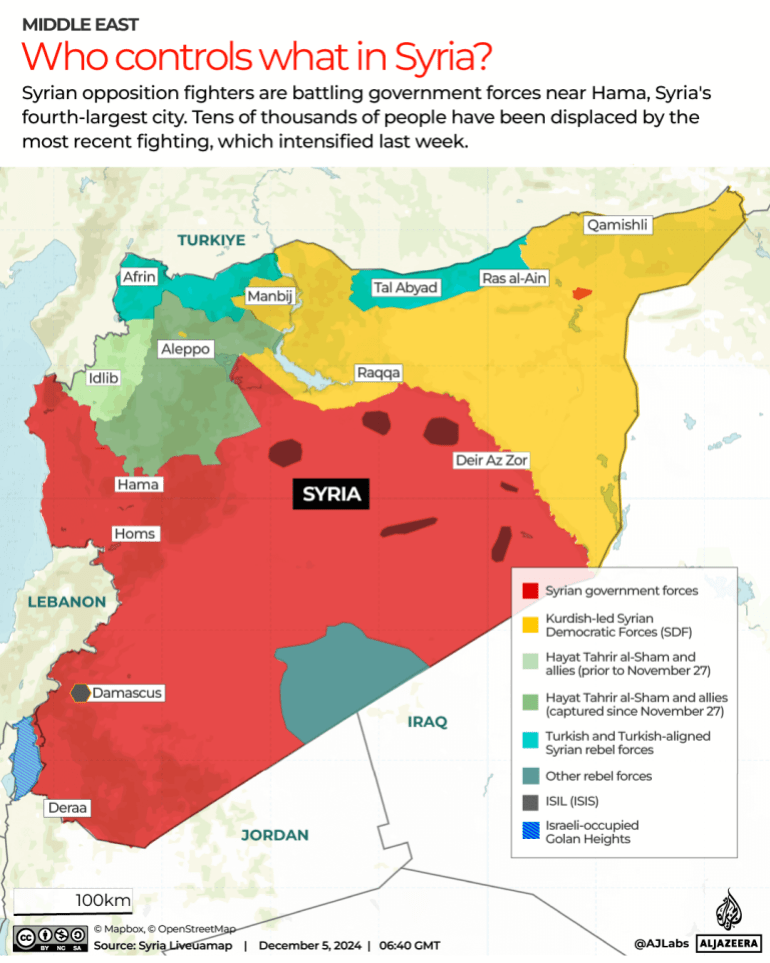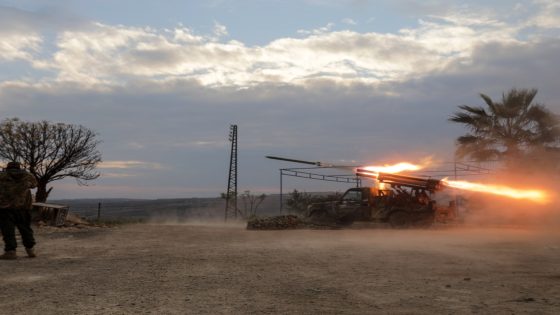The Syrian army says that opposition forces have entered Hama city after intense fighting, prompting its units to redeploy outside the major city amid a continuing lightning advance.
The army said in a statement on Thursday that it was redeploying its forces “to preserve civilian lives and prevent urban combat”, reversing an earlier claim denying that rebel fighters had entered the city.
Opposition commander Hassan Abdul Ghany posted on social media earlier on Thursday that his fighters had begun entering Hama, which they had been laying siege to since Tuesday amid heavy fighting overnight with the Syrian army, which was backed by intense Russian air attacks.
Al Jazeera’s Resul Serdar said the taking of Hama was “major development”.
“In just over a week they have managed to take full control of Syria’s second-largest city, Aleppo, and now the fourth-largest city,” Serdar said, reporting from the Turkish city of Kilis, on the border with Syria.
Opposition fighters pushed south from their enclave in northwest Syria, seizing Aleppo last week before reaching a strategic hill just north of Hama on Tuesday and advancing towards the city’s east and west flanks.
The Syrian Observatory for Human Rights said late on Wednesday that opposition fighters had “surrounded Hama city from three sides”.
“Violent clashes took place during the night between the rebels and the regime forces”, particularly in the Jabal Zayn al-Abidin area, just north of Hama, the United Kingdom-based monitor said.
The head of the Syrian Observatory, Rami Abdurrahman, said government forces were engaged in “fierce resistance and trying to stop the rebels’ advance”.

Hama lies more than a third of the way from Aleppo to Damascus and its capture would open the road to a rebel advance on Homs, the main central city that functions as a crossroads connecting Syria’s most populous regions.
It is also critical to the control of two major towns with sizeable minority religious communities; Muhrada, which is home to many Christians, and Salamiya, where there are many Ismaili Muslims.
Hama province also borders the coastal region of Latakia, a main base of popular support for President Bashar al-Assad.
Hama stayed in government hands throughout the war, which erupted in 2011 as a rebellion against al-Assad. Its fall to a revived armed uprising would send shockwaves through Damascus and its Russian and Iranian allies.
While Moscow has been largely focused on the war in Ukraine since launching a ground invasion in February 2022, Russian air attacks across rebel-held areas of northern Syria have sharply intensified over the past week.
Syrian state media quoted a military source late on Wednesday as saying Russian and Syrian air forces, alongside artillery units, had conducted “concentrated strikes on the … terrorists” in the Hama area.
Russia is assessing the situation in Syria and is in constant contact with the Syrian authorities, Kremlin spokesman Dmitry Peskov said on Thursday.
“At the moment, we are closely monitoring what is happening in Syria. We are in constant dialogue with our Syrian friends, with Damascus,” Peskov told reporters.
“Depending on the assessment of the situation, we will be able to talk about the degree of assistance that is needed by the Syrian authorities to cope with the militants and eliminate this threat.”
The most powerful opposition faction involved in the advances is Hayat Tahrir al-Sham (HTS), a former al-Qaeda affiliate. Its leader, Abu Mohammed al-Golani, has pledged to protect Syria’s religious minorities but many remain fearful.
On Wednesday, al-Golani visited Aleppo’s historic citadel in a symbolic moment. The group’s precursor was driven out of the city in 2016 after months of siege and intense fighting, in their biggest defeat of the war.





